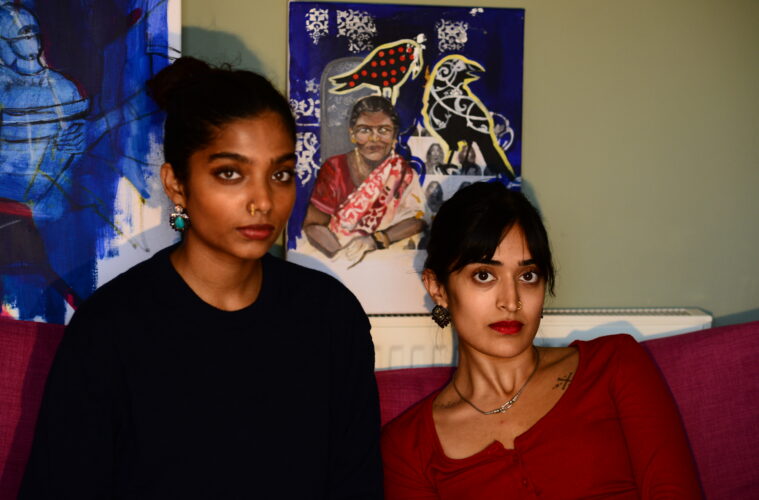We are Sahara and Zehra. We’re both into art. We are both confused young and recent graduates trying to live in London’s cost-of-living crisis. We both have a blend of work ethic and healthy delusion. To this end, we co-founded our small art business, Home On Me Collective.
We aid and champion emerging artists of various backgrounds. This can be through art interviews we’ll be sharing on our website, through professional networking, providing advice and through exhibitions. We also run art workshops (both for paying clients and free for charities). We hope to create a sort of hybrid model of both art business and art philanthropy, using Home on Me to fund both our lives and our charity, The Empty Wall Project. We will talk more about this process, its motivations, and its difficulties.
We met during our time at the University of the Arts London, where we curated a show in the student sphere that we named Home on Me, exploring the idea of home on one’s person. When we decided to start a professional venture, it only felt natural to use the same name. Other than interests and career ambitions, the main thing we had in common was the experiential knowledge that you don’t get opportunities so much as you make them with the resources you have. We’re both fortunate enough to have attended a top arts university, so we had to wring this as much as we could.
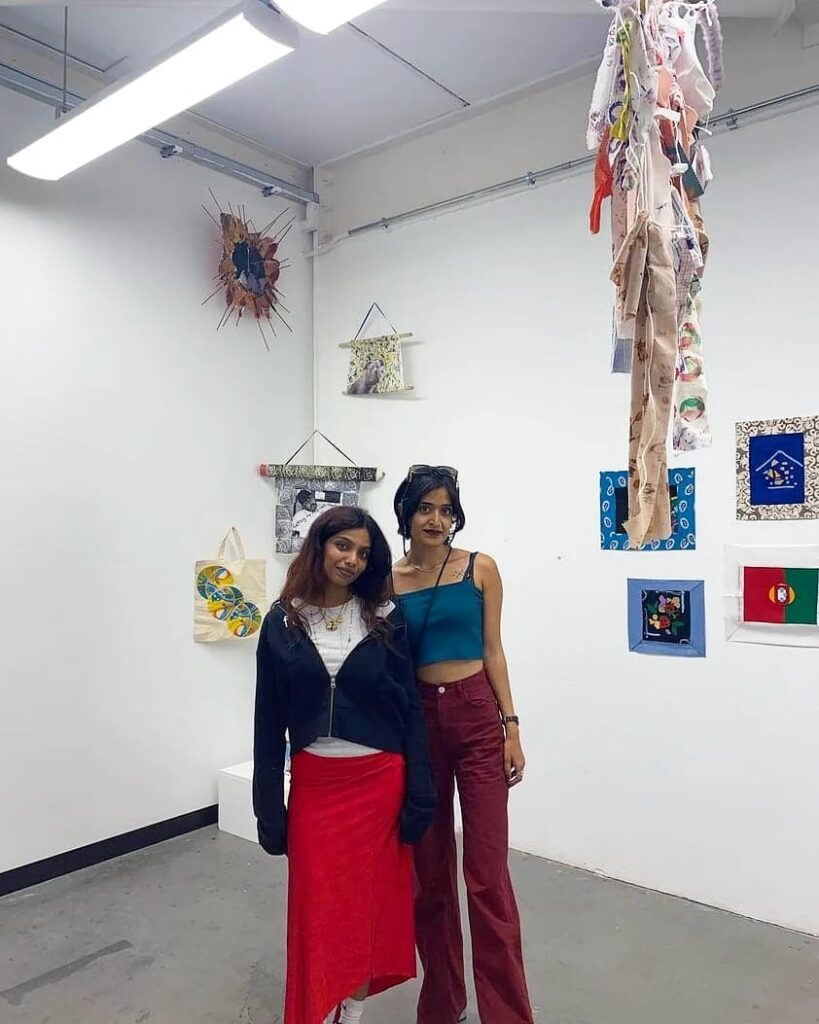
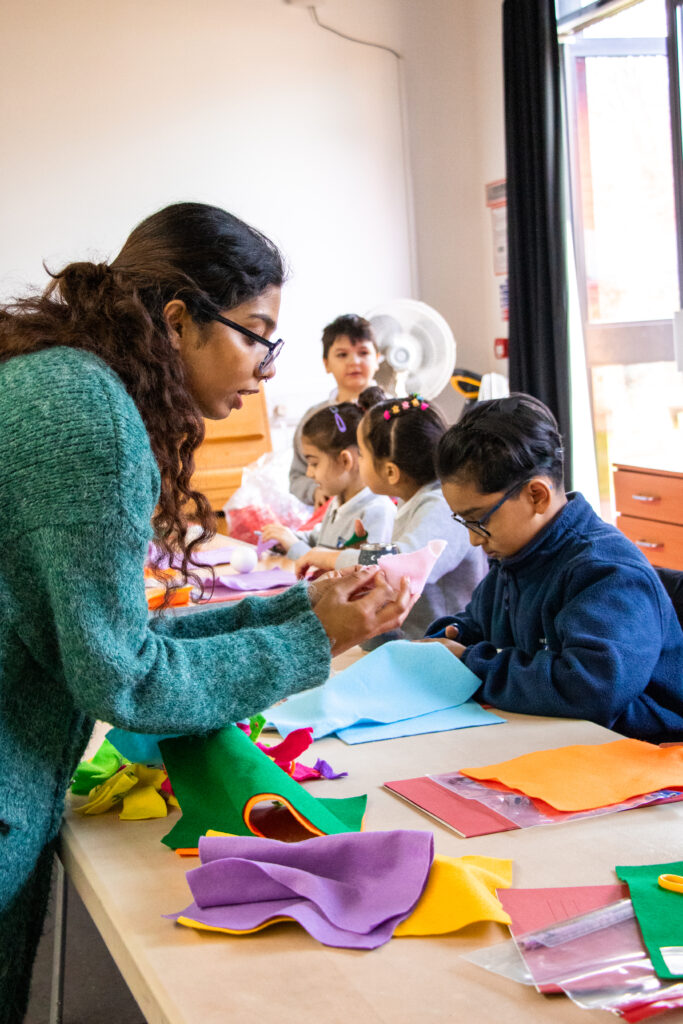
Navigating the Art World
One of us has been a visual artist for as long as she can remember. The other has always loved the arts but didn’t realise she could be part of this oh-so-exclusive club as a ‘curator,’ being part of the process of weaving stories of various artists into one.
Art, and thus curation, is, at its essence, a form of storytelling. Perhaps not as old as oral history and the written word, it is just as beautiful and expansive.
Navigating the art world has been a unique journey for us both. There have been instances of support and kindness beyond comprehension, and others where we are met with blank walls of gatekeeping knowledge to hedge out competition. But what is most unfortunate about the art world is that some blank walls have remained blank for decades and continue to do so.
While it is a misconception that art is entirely unregulated and brimming with money laundering, it is not unfair to say that the art world has fewer standard regulations than other industries, and fewer predetermined paths to success (other than nepotism). Zehra’s parents work in law and automobiles, and Sahara’s work in construction and IT. So suffice to say, that while they were well-off enough to send their daughters to university, they were not connected in the art world.
This is both a blessing and a curse. We create many of our own rules and forge our own path. Yet, we also find ourselves regularly lost and beholden to unspoken rules that are hard even to learn in the first place. As such, we have to learn on the go and through making mistakes. We go from not marketing an event enough so that only my mother shows up one day, to fruitful collaboration with established institutions the next. Receiving payment for such collaborations was a spark that ignited our first commercial exhibition, Homebody.
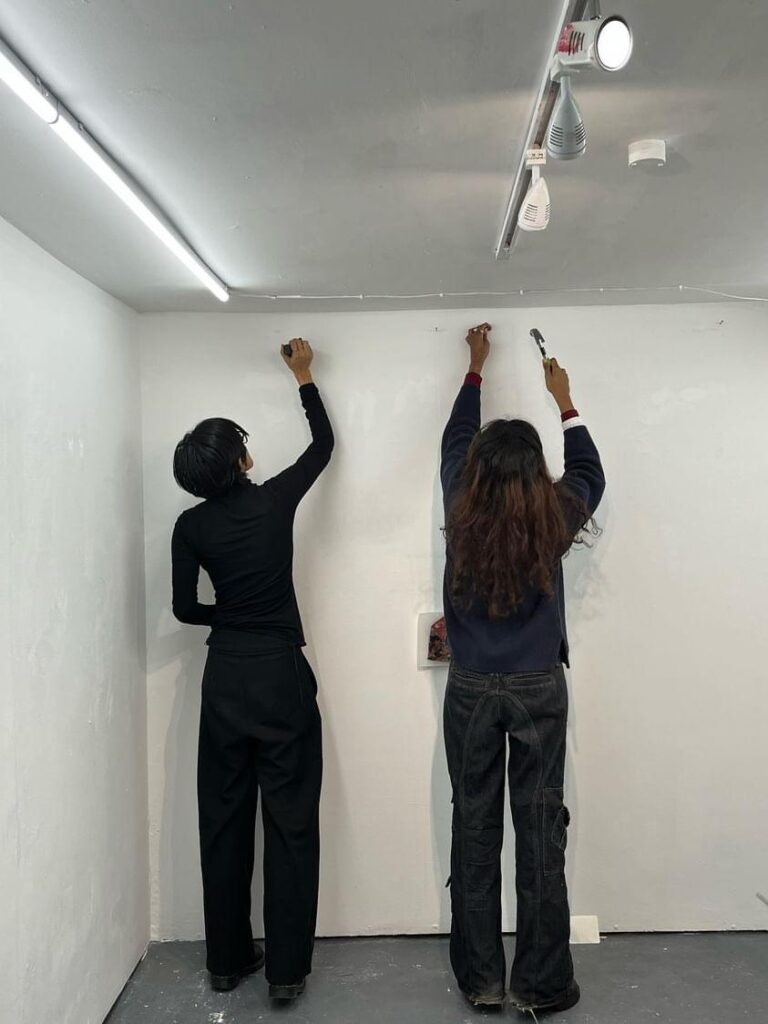
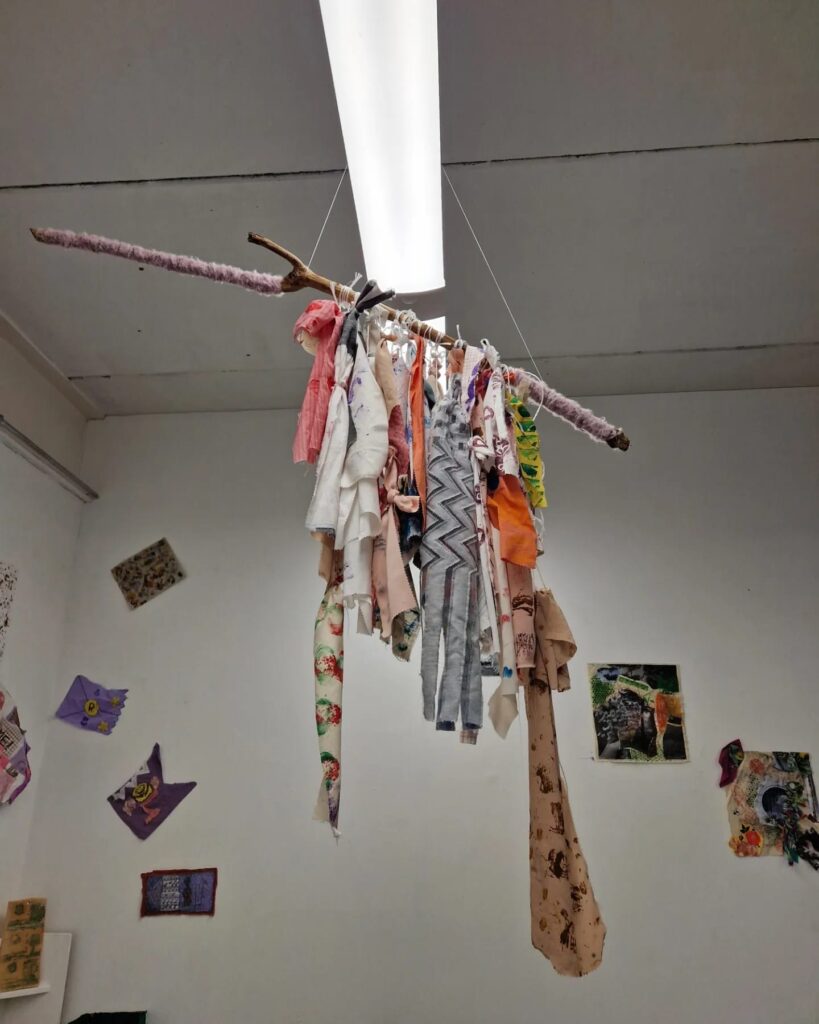
Homebody, Our First Exhibition
Homebody, is Zehra’s Solo Exhibition, curated by Sahara. Using canvas as a mirror, Zehra is able to self-reflect and self-actualise, finding humour in life’s pains and confusions. She desires more nuanced and human depictions of the female body, particularly the brown female body. They also serve to depict the process of girlhood to womanhood. Zehra’s family appears in her work to explore how external factors both dismantle and aid the process of becoming. Mixing realism with monstrous and fantastical allows her to express desires and emotions that normally go unsaid and to break the silence expected of women, breaking a silence through the visual.
These are the issues we love to explore through art. Because though explored by many, each interpretation is unique. Much of our time is spent interviewing artists, we will start sharing on our website to exhibit their work, as well as a means to help buyers discover them. A typical workday can greatly vary, which is what we love about this line of work. We are almost always talking to someone interesting. We find part-time, full-time, or freelance work to support ourselves. We rush from framers to printers, to studio visits, to café work sessions, to interviews, to openings to networks, to a comedy show of someone we’re looking to collaborate with. We are seldom bored.
Many of the issues we face are obvious; money, being taken seriously, and knowing how to delegate time and business assets. But one such issue we find to be one of the most difficult is that of tokenism. It is very difficult to not be defined as a ‘female-led collective’, or ‘South Asian Art company’. We are both proud of those things, but we work with global artists. And we are keen to be known as people who have artistic drive who happen to be women, and happen to be South Asian, as opposed to being artistic South Asian women.
More than the practical issues of running to cooperate work to art bits, the main issue we face is the attitudes toward art. Our slogan is ‘Dismantling traditional hierarchies.’ This has multiple layers to it. We want more women and people of colour working in the art sphere. But we also want everyone in the art space to embrace humour, dispose of toxic competition, and make the art world not seem like an intimidating elite space that you just have to ‘get.’
We love art and sharing it. We want to cater to all. Art prices are intimidating and confusing. We try to find ways to circumvent this. For example, Homebody features paintings of £1000, but there are also small originals worth 50, and limited edition totes and prints that perhaps your average student can buy.
With all these things said, our future is unsure. Are we doing another exhibition this year? It depends on how much money this one makes, if any. How much do we take for ourselves and for the company? How are we going to file our first tax returns? We don’t know.
What we do know, cliché though it may sound, is that we are excited at the prospect of facing it. And there is something very exhilarating about building something from the ground-up.
HOMEBODY runs at SPACE Mare St (E83RH) in London from the 24th to the 26th of August 2024. Give us a follow on Instagram to keep up to date with future exhibitions and artist interviews! If you’d like to get into art and don’t know how, or if you’re an artist looking for some guidance! Email or reach out to Home on Me Collective via email or Instagram DM.
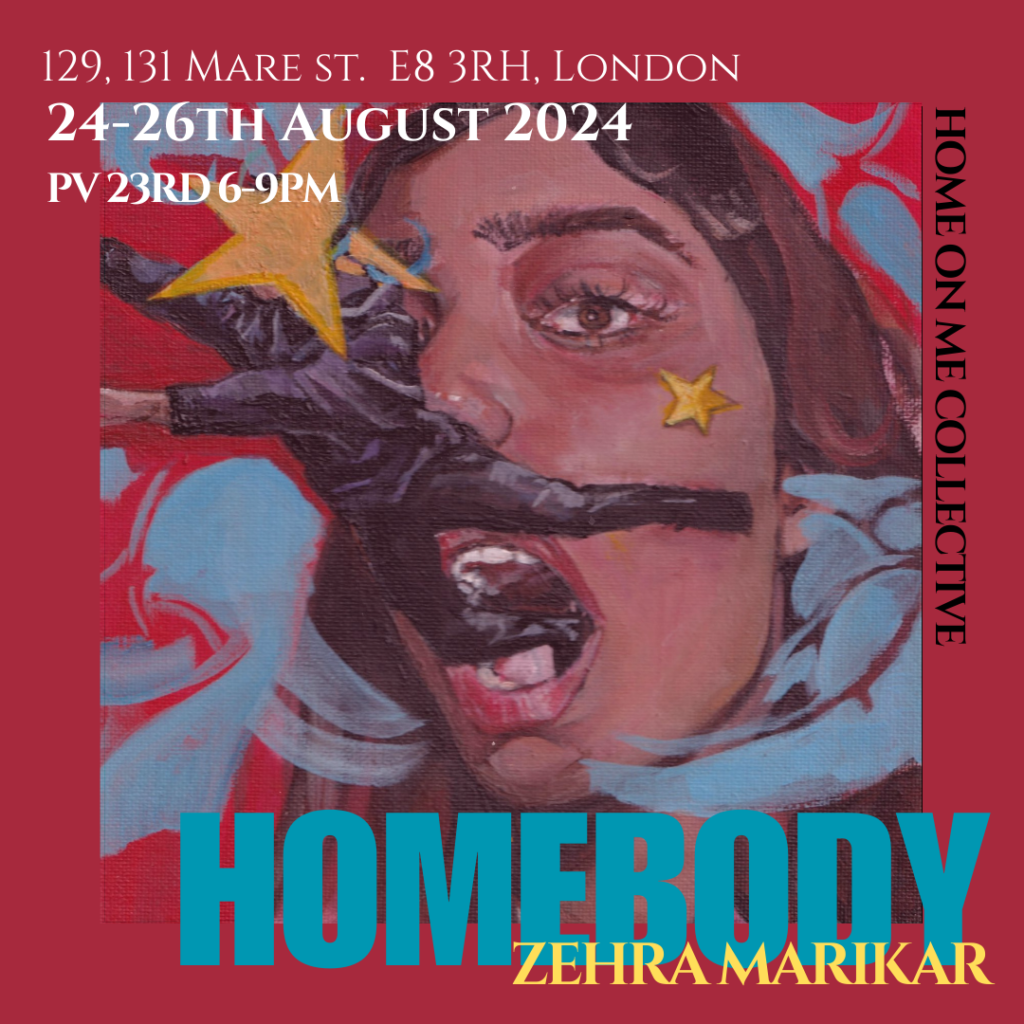
Yaska Sahara is a 24-year-old curator, writer, creative producer and entrepreneur. She relishes in engaging with the creative, fashion, and art, and the ways they intersect with literature, socio-political issues, and various types of personhood. Having lived in both the UK, India and the Netherlands, she has both personal and academic experience with culture studies and language learning, which allows her to engage with creative practices globally and through many angles.
Zehra Marikar is a 24-year-old multimedia artist, curator, creative practitioner, and entrepreneur based in London, from Chennai, India. Her art interweaves her reflections on home and identity and works with multiple mediums to explore how culture and geography shape notions of the self.

